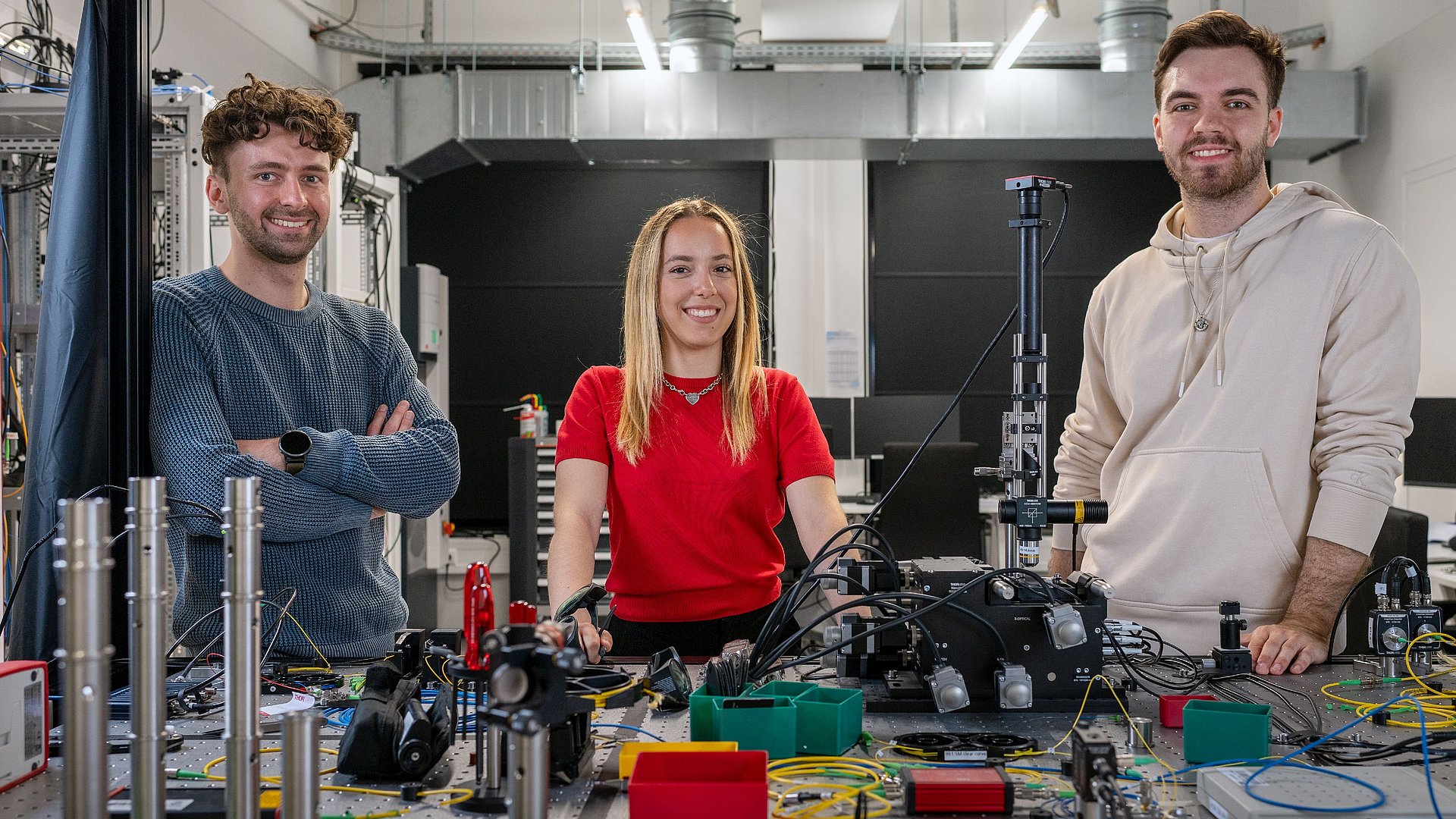It may be hard to explain, but for the students at PushQuantum, it's very easy to be fascinated by the world of quantum mechanics. Their mission is to make quantum technology understandable and accessible for all.
 Andreas Heddergott / TUM
Andreas Heddergott / TUM about quantum physics.
It all started with an article on quantum physics. "As a schoolgirl, I came across a report on quantum computing," recalls Ginevra Fulco. "Quantum mechanics was all so new to me, a tiny universe crammed with possibilities. It was love at first sight, and inspired me to study physics at university." She is now studying for a Master's in Applied and Engineering Physics at TUM and is an active member of the student initiative PushQuantum .
From November 29 to 30, students will tackle challenges set by quantum computing companies at the PushQuantum Hackathon in Garching. Registration is open until November 9.
This student club has the aim of connecting like-minded students and supporting them in their career planning, as well as bringing knowledge of quantum technologies to a wider public. At first sight, many phenomena in quantum physics seem to be impenetrably complex: For example, a pair of quantum-entangled particles can change their state simultaneously even when separated by vast distances. A quantum object can adopt states that are mutually exclusive under the laws of standard physics, such as an electron that spins clockwise and counterclockwise simultaneously.
As bizarre as these properties may seem, they form the physical bedrock of many modern technologies. While earlier inventions such as lasers, transistors, and solar cells are based on fundamental quantum effects, newer applications make targeted use of them, for example, in quantum computers or for the development of a tap-proof quantum internet. Ginevra Fulco is convinced that these new technologies will have an ever-increasing influence on our daily lives. For her Master's degree at the Professorship of Quantum Networks, she is developing a system that isolates sensitive quantum particles from external influences such as vibrations. This could allow many quantum experiments to run more stably in the future. "It's so important for all of us to understand the basic principles," she says.
Toward a societal discussion
Alexander Orlov, President of PushQuantum, agrees. With a Bachelor's degree in Physics and Political Science already under his belt, he is now studying for a Master's in Quantum Science and Technology : "We need to discuss as a society ways of dealing with these technologies responsibly-before they come into use. For that to happen, readily understandable information is essential, and that is exactly what we aim to provide." As part of their endeavors, the team organizes regular "Quantum Tuesday" talks at the Deutsches Museum. In addition, the students work on the research project "Quanten(t)räume" (Quantum Spaces, Quantum Dreams), developing outreach formats that address the possible applications of quantum technologies, including an interactive exhibition at the Deutsches Museum.
An online "Wiqi" page in German and English on the basics of quantum technology is also on the students' to-do list. "We aim to engage the readers through the use of different knowledge levels, regardless of their prior knowledge in the field of physics," says Leart Zuka. Currently studying for a Master's in Condensed Matter Physics at TUM, he is PushQuantum's IT officer. "So even my grandma can finally understand why I spend so much time in the lab," he adds with a grin.
PushQuantum currently has around 100 members, comprising both students and alumni. To enable them to gain professional benefits from their involvement, the club holds regular panel discussions and visits to research groups and companies. "We see our role as a bridge between science and society, but also as a stepping-stone for the upcoming generation of quantum talents," says Alexander Orlov.
Stepping-stone for business or research
As one example, the students are partnering with TUM Venture Lab Quantum / Semicon to run the Quantum Entrepreneurship Laboratory. In this course, students with technical and economics backgrounds form teams to tackle problems related to quantum research. Together, the participants can experience the phases of a simulated start-up-from the research idea to the business plan. In addition, PushQuantum is repeating its three-day hackathon in the fall, with visits to research groups, panel discussions, and quantum technology-based challenges to solve. Preparations are already in full swing.
"There's a great atmosphere of camaraderie at our meetings and events," says Ginevra Fulco, who is responsible for marketing and social media at the student club. "We're all crazy about quantum technologies, and can talk about them for hours!" She hopes to see more women students taking part in the next hackathon. "Some people are still baffled by the fact that I'm a woman studying physics." Convinced that more women are urgently needed in the field of natural sciences, she hopes her involvement will help convince girls and women to be inspired by quantum engineering. "It's important to me to pass on something of my personal passion."
- PushQuantum offers students various opportunities to connect with like-minded people and to support them in their career planning.
- Together with TUM Venture Lab Quantum / Semicon , the students are organizing entrepreneurship seminars.
This article was published in the in the 2/2025 issue of the new TUM Magazine.






